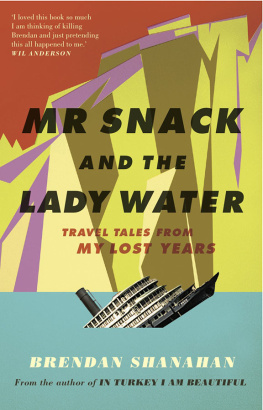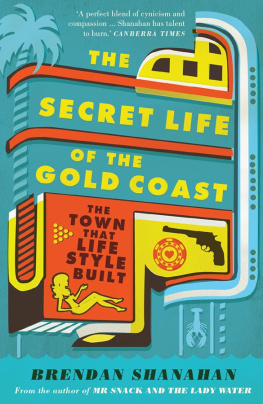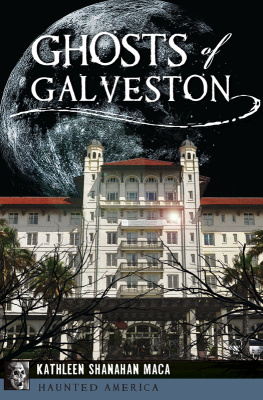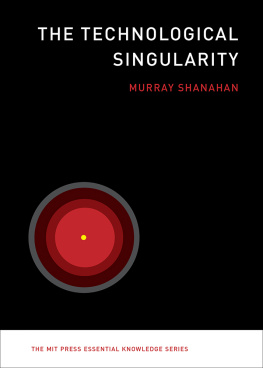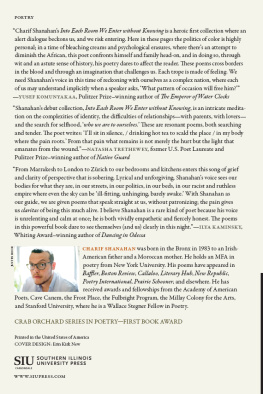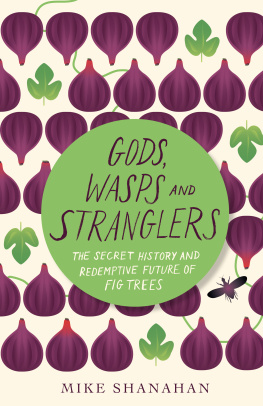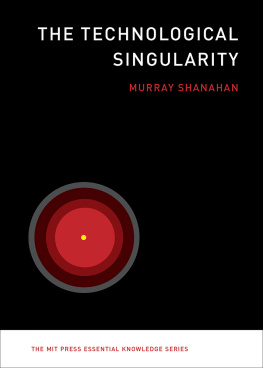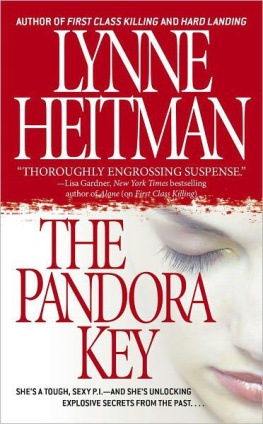A Note on Chronology
I have travelled, on and off, since the age of eighteen. This book is an attempt not only to chronicle some favourite anecdotes from those journeys, but also to justify what was a fairly lazy and debauched period. Because these stories cover a period of over ten years, starting in the mid1990s, many details may now be out of date. Chinese television, for instance, has improved a lot butfrom what I hearthe situation in some suburbs of Johannesburg has grown worse. I apologise if any of these obsolete details reflect poorly on a place or perpetuate redundant stereotypesthey were true at the time of writing, at least as I saw it. None of the journeys were commissioned or paid for by anyone but me. All are previously unpublished except Filler in Manila, which appeared (heavily edited) in the Sunday Telegraph s Sunday Magazine . Some names and details have been changed.
For Lee,
whose patience in the face of my self indulgence, poverty and short attention span borders on saintly
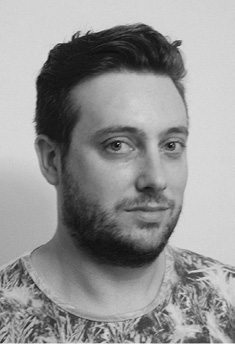
Brendan Shanahan is a writer based in Sydney and Las Vegas. He writes regularly for various publications internationally and is the author of The Secret Life of the Gold Coast (2004) and In Turkey I am Beautiful (2008). The latter was described as laugh out loud funny by the Sydney Morning Herald , named one of the best travel books ever by the Sun Herald and listed in the years 10 best non-fiction works by ABC Radio National.
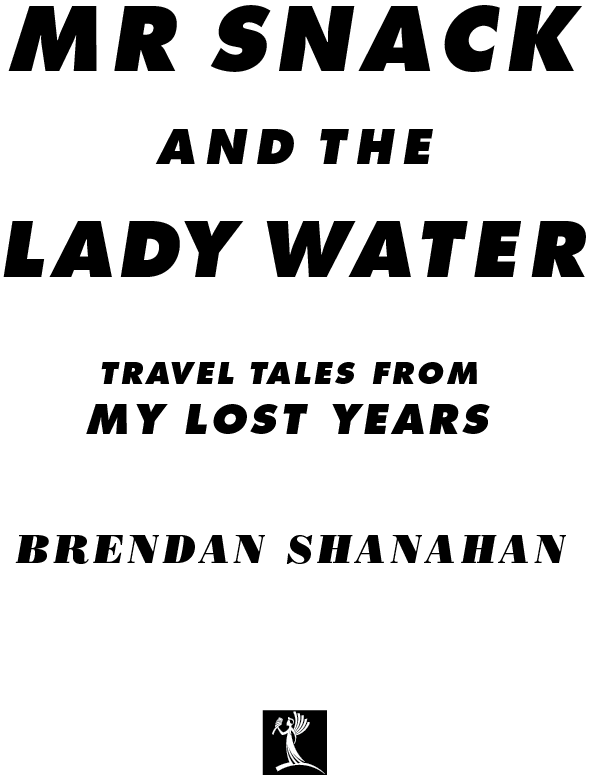
Contents
Mr Snack and the Lady Water
Day 1
Until I arrived in China my interest in the Yangtze River and the famous stretch of it known as the Three Gorges was minimal. It was nevertheless a journey that lived in my imaginationa slow boat down the Yangtze had a certain ring of the familiar, if not of a novel I had read and forgotten, then a Sunday matinee seen one twilit afternoon, a technicolour fantasy starring Rita Hayworth dressed in a crimson cheongsam with her eyes taped back.
This newfound desire to travel down the Yangtze stemmed, in part, from the fact that the Chinese government was damming the great river to create the worlds largest hydroelectric project. It was a process that would, ultimately, flood the Three Gorges, denying me and future generations the chance to see one of the worlds great natural wonders, a source of inspiration to generations of Chinese writers and artists. I would normally have avoided any travel that might end in the line At least you can say youve seen it, but soon even that compensation would be denied me.

The overnight train from the western city of Xian had been unusually punishing. After an ill-conceived dinner of a tepid pork bun, most of the journey had been spent balancing over a rocking squat toilet in the posture of an unorthodox rodeo rider, doing my best to avoid the minefield of frozen phlegm wads scattered about my feet, glinting in the fluorescent light like massive emeralds.
Waiting for me in the dawn light at the station was a travel agent, an earnest young woman in a discordantly cheerful pink sweatshirt printed with a picture of Minnie Mouse. I take your bag, she announced with the clipped efficiency that characterises much Chinese English. Tonight, you be at office. Five oclock. She pointed across the street. Dont be late, she said, in a tone of menacing finality that might have proved useful at the entrance of say, an exclusive nightclub or concentration camp. And with that she marched off into the foggy street, my backpack in one hand, her sweater a pink ghost in the gathering grey.
The boats to the Three Gorges leave from the western river port of Chongqing, a vast industrial city in central China. According to the proud boasts of the citys tourist brochures, it was home to the countrys largest aluminium factory andmore curiouslythe worlds biggest public toilet.
Despite ominous portents, Chongqing wasnt nearly as bad as expected. Here and there pockets of the old town remained. Street markets in the doorways of shabby homes offered ducks in bamboo cages or floppy carp in plastic buckets. The few surviving stepped alleys were relaxing oases free from the city traffic. From certain angles, the sorrowful blanket of mist that seemed to permanently shroud the skyline gave the city the look of a comic-book Gotham.
Any old-world appeal Chongqing may have possessed, however, was in the process of being vigorously scrubbed away. Construction sites covered the city; at every step signs appeared, cheerily announcing the imminent destruction of whole neighbourhoods. Huge malls stood eerily empty in the mist, props in Chinas coming capitalist surprise party. Soon only the worlds biggest toilet would differentiate Chongqing from any other city in the country, a convenient metaphor for the future of Chinas urban life.
After a day of aimless wandering, I eventually made my way back to the travel agency. Inside, there was no sign of anyone except two elderly women perched on a bench by the door, engaged in a low, conspiratorial conversation.
Mandy and Tina were from Madison, Wisconsin, a fact they shared immediately, almost involuntarily, as if it were an extension of their names or an honorary title: Their Royal Highnesses Lady Mandy and Tina of Madison, Wisconsin. It was but one of a number of, sometimes surprising, details of their lives I was to learn over the course of our journey.
Theres no one here, said Tina to me, disapprovingly. Where is she? She said shed be here. What if we miss the boat?
We could miss the boat, said Mandy, staring anxiously about the room. Its not very professional.
Over the next few days, Mandy and Tina were to become a subject of fascination to me. Although the pair had travelled extensively, including to a number of hazardous and obscure destinations, their adventures had inverted the usual effect of travel: instead of making them more confident and worldly, their globe-trekking seemed only to have exacerbated their anxieties and prejudices. Like elderly ninjas, every waking moment was spent in a state of alert. Their conversation was desperate and panicked, their movements excessively cautious, as if round every corner lurked scheming Oriental assassins covetous of their matching aquamarine backpacks and luminous white Reeboks.
Mandy and Tinas obsession with security was absolute; suspicion haunted every conversation and their luggage looked like a Houdini escape act, an Alcatraz of brass locks and cable wire sealing every pocket and zip. Even their make-up cases were armed with tiny combination locks, necessitating half an hour of intricate safe cracking every time they wanted to use a hairbrush. As they fussed with chains and inserted their passports into body cavities, I was struck by an image of their home: an enormous steel bank vault accessible only with dual keys and fingerprint recognition locks, the blast-proof circular doors opening slowly to offer them shelter from the freezing plains of Wisconsin.
Eventually, the tour guide arrived and announced our departure. Outside, a group of scrawny, desperate-looking porters descended on our luggage.
No, no! said Mandy. I can carry it myself!
We can carry! cried Tina. Can carry! Can carry!
Smiling as they ignored the womens pleas, the porters grabbed the bags, tied them to the yokes slung across their shoulders, and set off down the hill to the dock.

